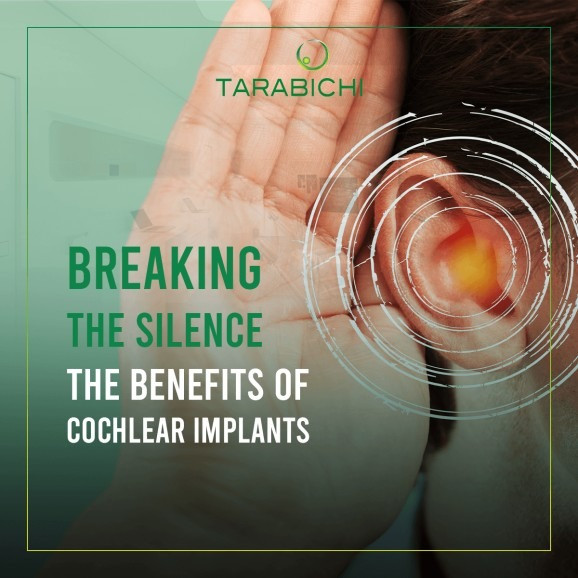Breaking the Silence: The Benefits of Cochlear Implants
Contact Us
Cochlear implants are a revolutionary technology that can offer a new world of sound for individuals with severe to profound hearing loss.
In this article; we will explore the benefits, surgery, and recovery associated with cochlear implants.
What is a cochlear implant ?
- A cochlear implant is a small device that is surgically implanted in the inner ear to offer individuals with severe to profound hearing loss a sense of sound.
- While cochlear implants do not restore normal hearing, they however, can significantly improve communication abilities and quality of life for the individual.
Cochlear implant components
Cochlear implants consist of two main components:
External Component:
The external component includes a microphone, a speech processor, and a transmitter.
The microphone picks up sound from the environment, which is then transmitted to the speech processor, and the speech processor converts the sound into digital signals and then sends them to the transmitter.
Internal Component:
The internal component includes a receiver and an electrode array.
The receiver is implanted under the skin behind the ear and receives the signals from the transmitter and sends it to the electrode array, then the electrode array stimulates the auditory nerve, which then sends signals to the brain, allowing the individual to perceive sound.
In addition to these main components, cochlear implants also include other parts such as a magnet, which helps hold the external and internal components together, and a speech processor microphone, which can be worn on the body or attached to the ear.
How cochlear implant works ?
Here's a general overview of how cochlear implants work:
- The external component of the cochlear implant system captures sound from the environment using a microphone.
- The captured sound is then processed by a speech processor, which converts it into digital signals.
- The speech processor sends the processed signals to a transmitter, which sends them to the internal component via a magnet.
- The internal component, which is surgically implanted under the skin behind the ear, consists of a receiver and an electrode array.
- electrodes stimulate the auditory nerve fibers, bypassing the damaged hair cells in the cochlea, and send signals to the brain.
- The brain interprets these signals as sound, allowing the individual to perceive sound.
Important Note: Cochlear implants do not restore normal hearing, but they can provide a significant improvement in communication abilities and quality of life for individuals with severe to profound hearing loss.
Also Read: Costs associated with Cochlear Implants
Cochlear implant indications
Here are some of the indications for cochlear implants:
Severe to profound hearing loss:
Cochlear implants are typically recommended for individuals with severe to profound sensorineural hearing loss, which is caused by damage to the inner ear or auditory nerve.
Limited benefits from hearing aids:
If an individual with hearing loss is not able to benefit from hearing aids, either because they no longer provide sufficient amplification or because the individual has difficulty understanding speech even with optimal hearing aid use, then cochlear implants may be considered.
Age of onset:
Cochlear implants are most effective when used early in life, particularly for children who are born deaf or who lose their hearing at a young age.
Communication difficulties:
If an individual with hearing loss is having difficulties communicating with others, such as in social or work situations, despite optimal hearing aid use, then cochlear implants may be considered.
Health status:
It fits individuals with certain medical conditions that make them unsuitable candidates for other types of hearing loss treatments, such as ear surgery or hearing aids.
Who gets cochlear implants ?
Cochlear implants are typically recommended for individuals with severe to profound hearing loss who do not benefit from hearing aids.
Here are some groups of people who may benefit from cochlear implants:
Children:
Cochlear implants are most effective when used early in life, particularly for children who are born deaf or who lose their hearing at a young age.
Adults:
Adults with severe to profound hearing loss who do not benefit from hearing aids may also benefit from cochlear implants.
Seniors:
Older adults with hearing loss may also benefit from cochlear implants, as they can improve cognitive function and reduce the risk of social isolation and depression.
Individuals with single-sided deafness:
Cochlear implants can also be used to treat single-sided deafness, a condition where an individual has profound hearing loss in one ear but normal hearing in the other.
Individuals with specific medical conditions:
Cochlear implants may be considered for individuals with certain medical conditions that make them unsuitable candidates for other types of hearing loss treatments, such as ear surgery or hearing aids.
It is important to note that the decision to get a cochlear implant should be made in consultation with an audiologist and otolaryngologist (ear, nose, and throat specialist) who specialize in cochlear implants.
Also read:
- Breathe Easy Again: Expert Sinus Surgery in Dubai 2025!.
- keloids and hypertrophic scars | identify the difference!.
If you are looking for an Audiology Clinic in Dubai or the Audiologist in Dubai please reach out to us on the below details, our team comprises of only the best ent doctors in UAE and the region.




